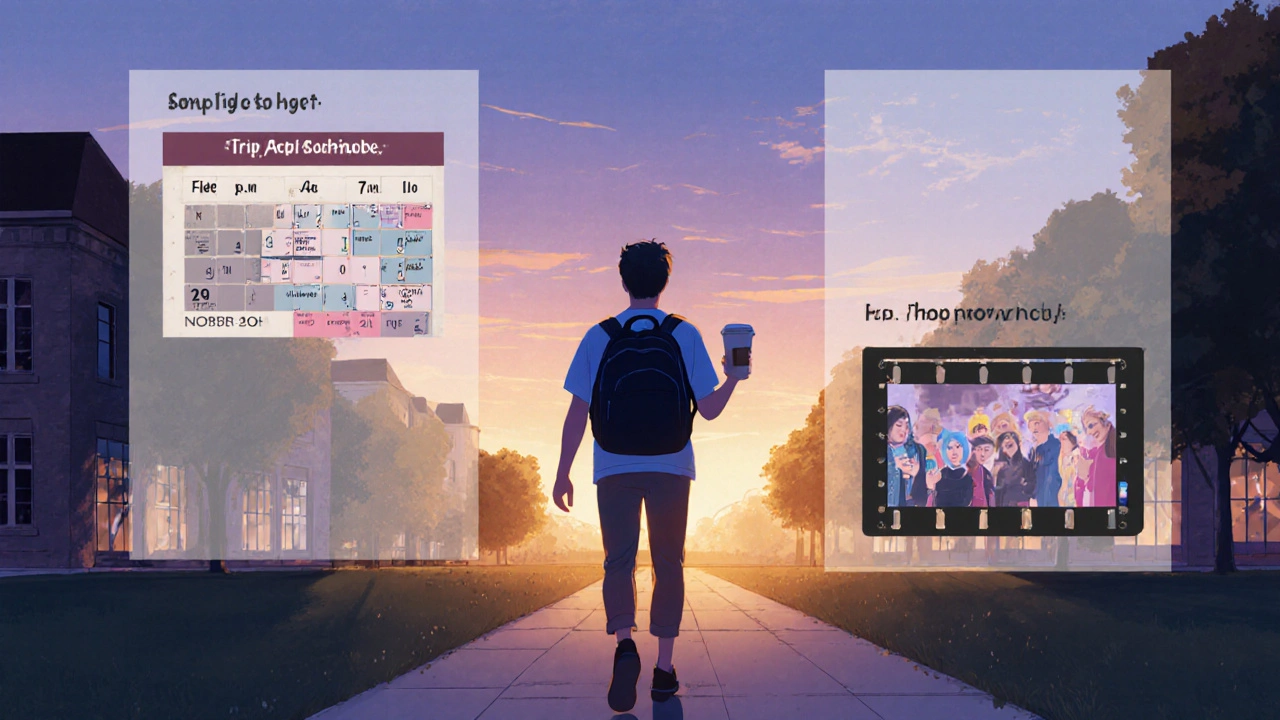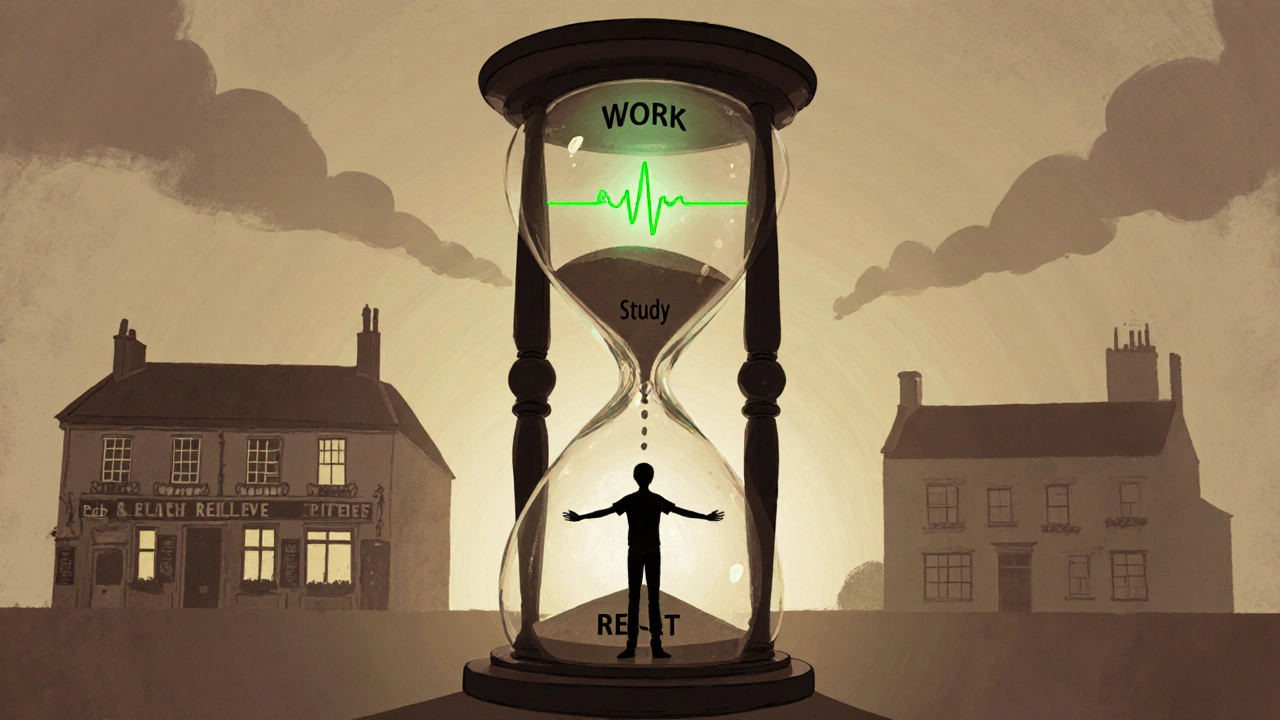
Working part-time while studying in the UK isn’t just about paying rent-it’s about surviving the rhythm of university life. You’ve got lectures at 9 a.m., a shift at the campus café at 4 p.m., a group project due Friday, and your flatmates planning a pub night on Thursday. It’s not a myth that students juggle all this. It’s reality. And if you’re not careful, you’ll burn out before Christmas.
How Many Hours Can You Actually Work?
The UK government lets international students on a Student visa work up to 20 hours a week during term time. That’s not a suggestion-it’s a rule. Break it, and you risk your visa. Domestic students don’t have that cap, but most still stick to 15-20 hours. Why? Because studies show students who work more than 20 hours a week are 37% more likely to drop a module or fail an exam, according to a 2024 analysis by the Higher Education Policy Institute.
That 20-hour limit sounds generous until you realize it’s not just about clocking in. It’s about travel time, pre-shift prep, post-shift recovery, and mental bandwidth. A 5-hour shift on a Tuesday isn’t just five hours. It’s an hour commuting, an hour eating and resting after, and another hour mentally recovering from customer complaints or a rushed service rush. You’re left with maybe 12 usable hours for everything else.
Choose Your Job Wisely
Not all part-time jobs are created equal. A job at a supermarket with fixed hours and a 30-minute break? That’s manageable. A bar job that runs from 10 p.m. to 2 a.m. three nights a week? That’s a sleep killer. And don’t assume campus jobs are automatically better-some university admin roles require you to be available during peak lecture times.
Look for jobs that:
- Offer flexible scheduling (like library assistants or research helpers)
- Allow shift swaps (common in campus cafés and student unions)
- Have quiet downtime (e.g., tutoring or marking scripts)
- Are within walking distance or on campus
Students who work on campus report 42% less stress about commuting, according to a 2025 survey by the National Union of Students. That’s not just convenience-it’s saved energy you can use for studying or sleeping.
Social Life Isn’t Optional
You didn’t come to the UK just to study. You came to experience something new-to meet people, to explore, to laugh at things that don’t make sense in your home country. Social time isn’t a luxury. It’s part of your mental health toolkit.
But here’s the catch: if you’re working 18 hours a week and sleeping 5 hours a night, your social life shrinks to one weekend night. And if that night is spent recovering from a shift, you’re not really socializing-you’re just lying on the couch scrolling TikTok.
Plan your social time like you plan your shifts. Block out one evening a week as non-negotiable. It doesn’t have to be big. A coffee with a classmate after a 3 p.m. lecture. A walk in the park with your flatmate on Sunday morning. A 2-hour movie night where you don’t talk about deadlines. These moments rebuild your brain.

Use the Calendar Like a Pro
Google Calendar isn’t just for lectures. It’s your lifeline. Block out:
- Classes
- Work shifts
- Study sessions (minimum 2-hour blocks)
- Meals
- Sleep (7+ hours, no exceptions)
- Social time (yes, even if it’s just 90 minutes)
When you see your week laid out like this, you’ll notice gaps. Those gaps are your breathing room. If there are no gaps? You’re overbooked. Time to say no to that extra shift or that weekend trip that’s not worth the crash.
Pro tip: Color-code your calendar. Red for work, blue for study, green for social, purple for sleep. You’ll start seeing patterns. Maybe you notice you’re always working on Mondays and never have energy for the Tuesday seminar. Adjust. Swap shifts. Talk to your manager.
Learn to Say No-Without Guilt
You’ll get asked to pick up a shift. You’ll get invited to a party. You’ll feel pressure to say yes to both. That’s normal. But here’s the truth: saying yes to everything means saying no to yourself.
Practice this script: “I’d love to, but I’ve already got a shift that day and I need to protect my study time.” Or: “I’m taking a quiet night to recharge-I’ll catch up with you next week.”
People respect boundaries when they’re clear. Most of your classmates are struggling too. They’ll understand. And if they don’t? That’s their problem, not yours.

Watch for the Warning Signs
It’s easy to think, “I’m fine,” when you’re running on caffeine and adrenaline. But burnout doesn’t come with a siren. It creeps in.
Signs you’re tipping over:
- Forgetting to eat or skipping meals because you’re too tired
- Getting sick more often (your immune system is drained)
- Feeling numb during lectures or social events
- Procrastinating on everything, even small tasks
- Constantly feeling guilty for resting
If you recognize even two of these, it’s not a bad week-it’s a red flag. Talk to your university’s student support team. Most UK universities have free, confidential counseling. Use it. It’s what it’s there for.
Real Students, Real Routines
Meet Maya, a 21-year-old from Nigeria studying biology in Edinburgh. She works 16 hours a week as a lab assistant. Her shift is Tuesday and Thursday, 1-5 p.m. She eats lunch with her study group right after. Friday nights are for her flatmates. Sundays are for laundry, meal prep, and one hour of video calls home. She sleeps 7.5 hours. She passed all her exams with a 2:1.
Then there’s Liam, from Manchester. He works 25 hours a week at a pub, mostly weekends. He’s tired all the time. He missed three tutorials last term. He’s on academic probation. He still says, “I need the money.” But he’s not happy.
Money matters. But so does your future. And your mental health. One isn’t more important than the other. They’re both part of the same equation.
What Happens After Term Ends?
When exams are over, you can work full-time. Use that time wisely. Save up. Travel. Rest. Catch up on sleep. Don’t just work to fill the time. Use the break to reset so you come back stronger next term.
Some students use the summer to do internships. Others work at festivals or seaside towns. Either way, it’s your chance to recharge without the pressure of deadlines.
Remember: your degree isn’t just about grades. It’s about learning how to manage your life. That’s a skill that lasts longer than any exam result.
Can I work more than 20 hours a week if I’m a UK student?
No. International students on a Student visa are legally limited to 20 hours per week during term time. Exceeding this can lead to visa cancellation. Domestic students aren’t legally capped, but working more than 20 hours significantly increases the risk of academic failure and burnout. Most universities recommend staying under 15-20 hours for balance.
What are the best part-time jobs for students in the UK?
The best jobs are those that fit around your schedule and don’t drain your energy. On-campus roles like library assistants, research helpers, or student ambassadors are ideal because they’re flexible and close to your classes. Tutoring, marking scripts, or working in the student union café also offer quieter hours and understanding managers. Avoid late-night bar jobs unless you’re certain you can still sleep and study.
How do I avoid burnout while working and studying?
Prioritize sleep, meals, and one consistent social block each week. Use a color-coded calendar to visualize your time. Learn to say no to extra shifts or events when you’re already stretched. If you’re constantly tired, forgetful, or emotionally numb, talk to your university’s student support services. Burnout isn’t weakness-it’s a signal your system is overloaded.
Should I work during exam season?
It’s better to reduce your hours or take time off during exam season. Even 5-10 hours a week can be enough to cover essentials. Use the extra time to revise, rest, and reduce stress. Most employers understand exam periods-if you ask in advance, many will let you swap shifts or take unpaid leave. Your grades matter more than one extra paycheck.
Is it worth it to work part-time in the UK as a student?
Yes-if you do it right. Working helps cover living costs, builds responsibility, and gives you real-world experience. But if it’s costing you sleep, grades, or mental health, it’s not worth it. The goal isn’t to work the most hours-it’s to work the right hours. Balance is the real win.